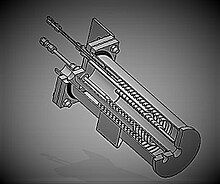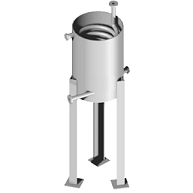Draft:Sample coolers
| Submission declined on 23 July 2024 by SafariScribe (talk). This submission is not adequately supported by reliable sources. Reliable sources are required so that information can be verified. If you need help with referencing, please see Referencing for beginners and Citing sources. This draft's references do not show that the subject qualifies for a Wikipedia article. In summary, the draft needs multiple published sources that are:
Where to get help
How to improve a draft
You can also browse Wikipedia:Featured articles and Wikipedia:Good articles to find examples of Wikipedia's best writing on topics similar to your proposed article. Improving your odds of a speedy review To improve your odds of a faster review, tag your draft with relevant WikiProject tags using the button below. This will let reviewers know a new draft has been submitted in their area of interest. For instance, if you wrote about a female astronomer, you would want to add the Biography, Astronomy, and Women scientists tags. Editor resources
|  |
| Submission declined on 16 December 2023 by Redstar0005 (talk). This submission is not suitable for Wikipedia. Please read "What Wikipedia is not" for more information. This submission reads more like an essay than an encyclopedia article. Submissions should summarise information in secondary, reliable sources and not contain opinions or original research. Please write about the topic from a neutral point of view in an encyclopedic manner. Declined by Redstar0005 12 months ago. |  |
| Submission declined on 24 November 2023 by Timtrent (talk). This submission is not suitable for Wikipedia. Please read "What Wikipedia is not" for more information. This submission reads more like an essay than an encyclopedia article. Submissions should summarise information in secondary, reliable sources and not contain opinions or original research. Please write about the topic from a neutral point of view in an encyclopedic manner. Declined by Timtrent 13 months ago. |  |
 Comment: Past reviewer comments pretty much cover it. Redstar0005 talk to me! 19:05, 16 December 2023 (UTC)
Comment: Past reviewer comments pretty much cover it. Redstar0005 talk to me! 19:05, 16 December 2023 (UTC)
 Comment: Please convert the list formatted sections into sentences in prose. Graeme Bartlett (talk) 21:14, 13 December 2023 (UTC)
Comment: Please convert the list formatted sections into sentences in prose. Graeme Bartlett (talk) 21:14, 13 December 2023 (UTC)
 Comment: Please supply the page numbers for the books that you are using as references. There are 4 books here with possibly 5 page numbers needed. Graeme Bartlett (talk) 21:13, 13 December 2023 (UTC)
Comment: Please supply the page numbers for the books that you are using as references. There are 4 books here with possibly 5 page numbers needed. Graeme Bartlett (talk) 21:13, 13 December 2023 (UTC)
Sample coolers are important components of sampling system. Infect, sample cooler is most critical component for any sampling system which reduce sample temperature and make them suitable for Online or manual analysis
Sample cooler is a Heat exchanger [1] OR unfired pressure vessel designed to cool hot sample from process to the desired temperature. Samples cooled from sample cooler are either "collected manually for laboratory analysis" OR these samples can be connected to "Online Analyzers" for measurement of Chemical Properties.
Sample coolers are important components of sampling system. Infect, sample cooler is most curtail component for any sampling system which reduce sample temperature and make them suitable for Online or manual analysis
Most of the times Laboratory instruments and Online analyzers use very delicate sensors. These sensors cannot handle High temperature and pressure samples. Sample coolers are used to cool sample and to protect downstream instruments.
Sample coolers are also used for cooling samples for
- Steam and Water Analysis System (SWAS)
- Process analyzers and Gas analyzers in Refinery and
- Continuous Emission monitoring System (CEMS)
- Manual sampling for Oil and Gas industry
- Sampling in Pharmaceutical plants

Following are important aspects while designing sample coolers:
[edit]- Mechanical Design: Sample cooler must be designed to handle high pressure and High temperature of samples. Just to give example Sample cooler used in steam and water analysis system (SWAS) is used to cool Superheated Steam from Boiler which is at temperature as high as 600 Deg C and Pressure 300 Bar. These sample coolers are often certified as Unfired pressure vessels as per design codes like
- Thermal Designing: This is most important aspect for sample cooler. Sample cooler should able to cool High temperature samples efficiently using Utilities like cooling water, Chilled water or Air.
- Representative sample: As samples from sample cooler are used for Chemical analysis. It is very important that sample cooler should not effect properties of samples while cooling same.
- Material Selection: Material selection should be such as sample or cooling media shall not cause corrosion of sample cooler parts
- Size: Sample cooler parts must be design to hold required flow for effective chemical analysis of samples
- Drain ability: cleanability aspects
- Safety: Sample coolers are used to protect Operator and instrument & sensors from High Temperature Hazard. Thus sample cooler itself is important component to ensure safety. But, In some abnormal conditions sample cooler may face issues like corrosion, scaling or Failure. Thus it is very important to see that sample coolers can be isolated for maintenance.

Type of sample cooler:
[edit]Sample coolers can be classified based on:
- Cooling Utilities:
- Water Cooled
- Air cooled
- Type of Heat Exchanger:
- Parallel flow design
- Counter flow design
- Construction:
- Helical coil in shell sample coolers:
- Single Helical Coil
- Double Helical coil in shell
- Spiral coil in shell sample cooler
- Shell and Tube sample coolers
- Helical coil in shell sample coolers:
Helical coil sample coolers:
[edit]Helical coil water cooled sample coolers are most common type of sample coolers used in industry Today. These type of sample coolers are not only provide efficient cooling of samples but also compact compared with any other type of sample coolers. Helical coil sample coolers are also most compact and designed to cool sample from elevated temperature to temperature required for analyzer sensors. Sample coolers are designed as recommended in ASME PTC 19.11-2008 [4] and ASME Section VIII Div 1[5] standard.
Helical coil sample coolers are the most popular because of their simple but very effective design
References
[edit]- ^ Shah, Ramesh K (11 August 2003). Fundamentals of Heat Exchanger Design. John Wiley & Sons. ISBN 978-0-471-32171-2.
- ^ ASME Standards. "BPVC Section VIII-Rules for Construction of Pressure Vessels Division 1".
- ^ VGB Org. "Standard for sample cooler design".
- ^ "Steam and Water Sampling, Conditioning, and Analysis in the Power Cycle - ASME". www.asme.org. Retrieved 2023-11-06.
- ^ "ASME BPVC Section VIII-Division 1-Rules for Construction of Pressure Vessels - ASME". www.asme.org. Retrieved 2023-11-06.
